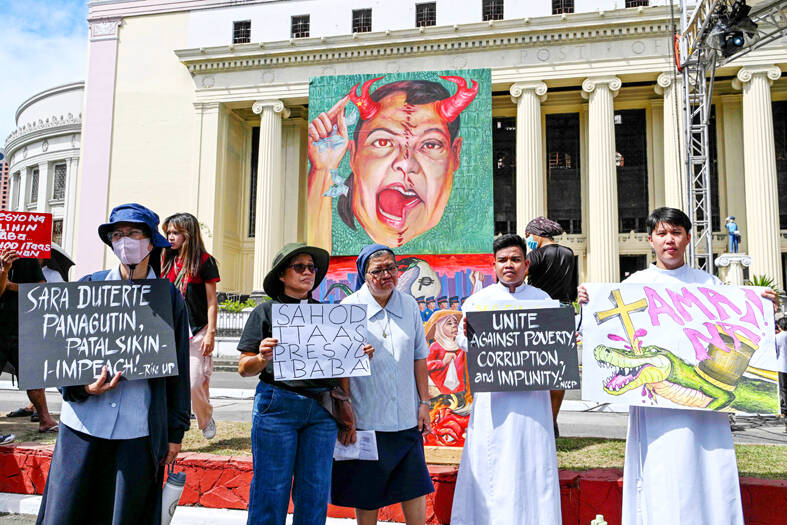Thousands of protesters yesterday took to the streets of Manila, urging the Philippine House of Representatives to impeach Vice President Sara Duterte.
Duterte faces three impeachment complaints over alleged misconduct and misuse of millions of US dollars in government funds, but legislators have yet to tackle them just days before Congress adjourns next week ahead of the May midterm elections.
The 46-year-old vice president, who is estranged from Philippine President Ferdinand Marcos Jr, but remains his constitutional successor in case he is unable to perform his duties, has denied the allegations.

Photo: AFP
Marcos has urged Congress not to pursue Duterte’s impeachment, calling it a “storm in a teacup” that would distract the legislature from its primary responsibilities.
Protesters mostly wearing white shirts held placards calling for Duterte’s removal and chanted “Impeach. Impeach Sara now,” as they gathered beside Manila’s busiest avenue.
About 4,000 people took part in the morning rally, police said, with authorities deploying 7,400 riot police to keep the peace.
Those numbers were dwarfed by a mammoth rally held on Jan. 13 by a conservative sect that opposes Duterte’s impeachment.
Philippine Representative Percival Cendana, who backs one of the impeachment complaints, joined yesterday’s rally and urged his colleagues to move fast.
Every day of inaction “condones the impunity, the abuse of power and the harassment that Duterte is doing to our country’s leaders,” he told reporters.
An impeachment would only proceed if it is backed by a third of House of Representatives members, and an impeached official can be removed from office by a two-thirds vote in the Senate.
“The Filipino people are here, ready to stand for truth and justice. Let’s not fail them,” Cendana said.

A Ministry of Foreign Affairs official yesterday said that a delegation that visited China for an APEC meeting did not receive any kind of treatment that downgraded Taiwan’s sovereignty. Department of International Organizations Director-General Jonathan Sun (孫儉元) said that he and a group of ministry officials visited Shenzhen, China, to attend the APEC Informal Senior Officials’ Meeting last month. The trip went “smoothly and safely” for all Taiwanese delegates, as the Chinese side arranged the trip in accordance with long-standing practices, Sun said at the ministry’s weekly briefing. The Taiwanese group did not encounter any political suppression, he said. Sun made the remarks when

The Taiwanese passport ranked 33rd in a global listing of passports by convenience this month, rising three places from last month’s ranking, but matching its position in January last year. The Henley Passport Index, an international ranking of passports by the number of designations its holder can travel to without a visa, showed that the Taiwan passport enables holders to travel to 139 countries and territories without a visa. Singapore’s passport was ranked the most powerful with visa-free access to 192 destinations out of 227, according to the index published on Tuesday by UK-based migration investment consultancy firm Henley and Partners. Japan’s and

BROAD AGREEMENT: The two are nearing a trade deal to reduce Taiwan’s tariff to 15% and a commitment for TSMC to build five more fabs, a ‘New York Times’ report said Taiwan and the US have reached a broad consensus on a trade deal, the Executive Yuan’s Office of Trade Negotiations said yesterday, after a report said that Washington is set to reduce Taiwan’s tariff rate to 15 percent. The New York Times on Monday reported that the two nations are nearing a trade deal to reduce Taiwan’s tariff rate to 15 percent and commit Taiwan Semiconductor Manufacturing Co (TSMC, 台積電) to building at least five more facilities in the US. “The agreement, which has been under negotiation for months, is being legally scrubbed and could be announced this month,” the paper said,

NATIONAL SECURITY THREAT: An official said that Guan Guan’s comments had gone beyond the threshold of free speech, as she advocated for the destruction of the ROC China-born media influencer Guan Guan’s (關關) residency permit has been revoked for repeatedly posting pro-China content that threatens national security, the National Immigration Agency said yesterday. Guan Guan has said many controversial things in her videos posted to Douyin (抖音), including “the red flag will soon be painted all over Taiwan” and “Taiwan is an inseparable part of China,” while expressing hope for expedited “reunification.” The agency received multiple reports alleging that Guan Guan had advocated for armed reunification last year. After investigating, the agency last month issued a notice requiring her to appear and account for her actions. Guan Guan appeared as required,